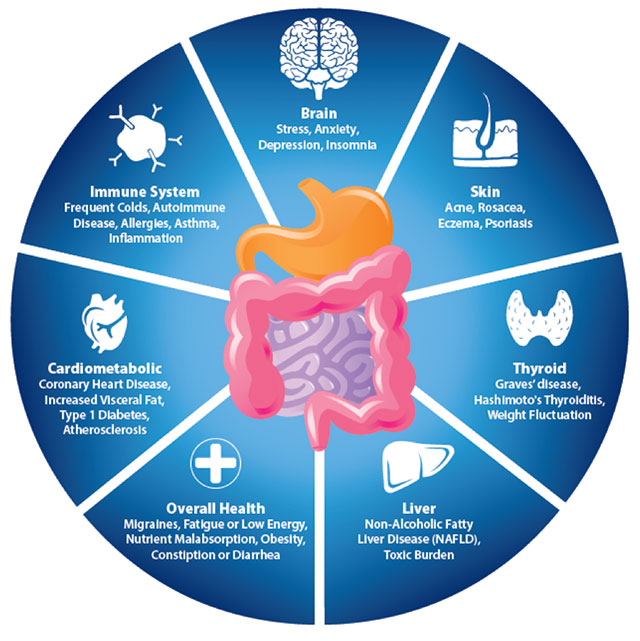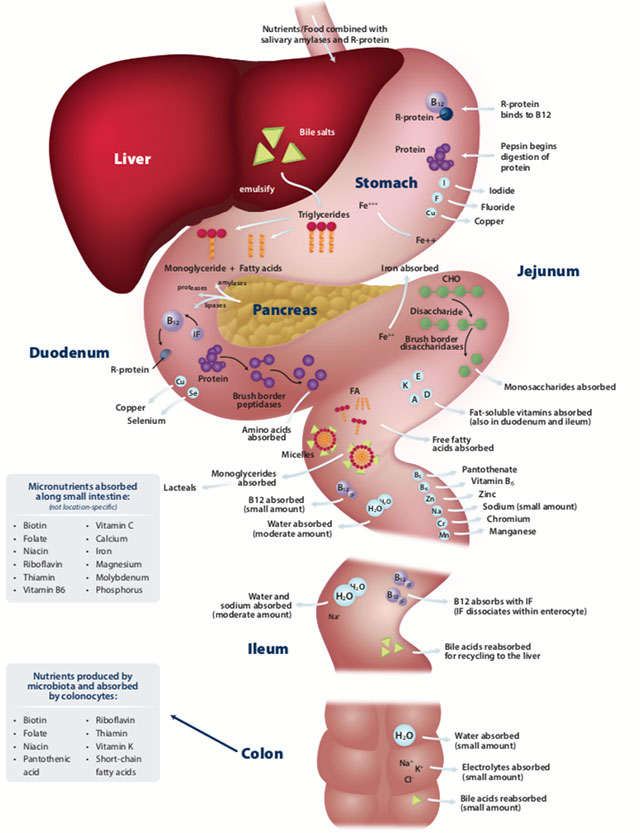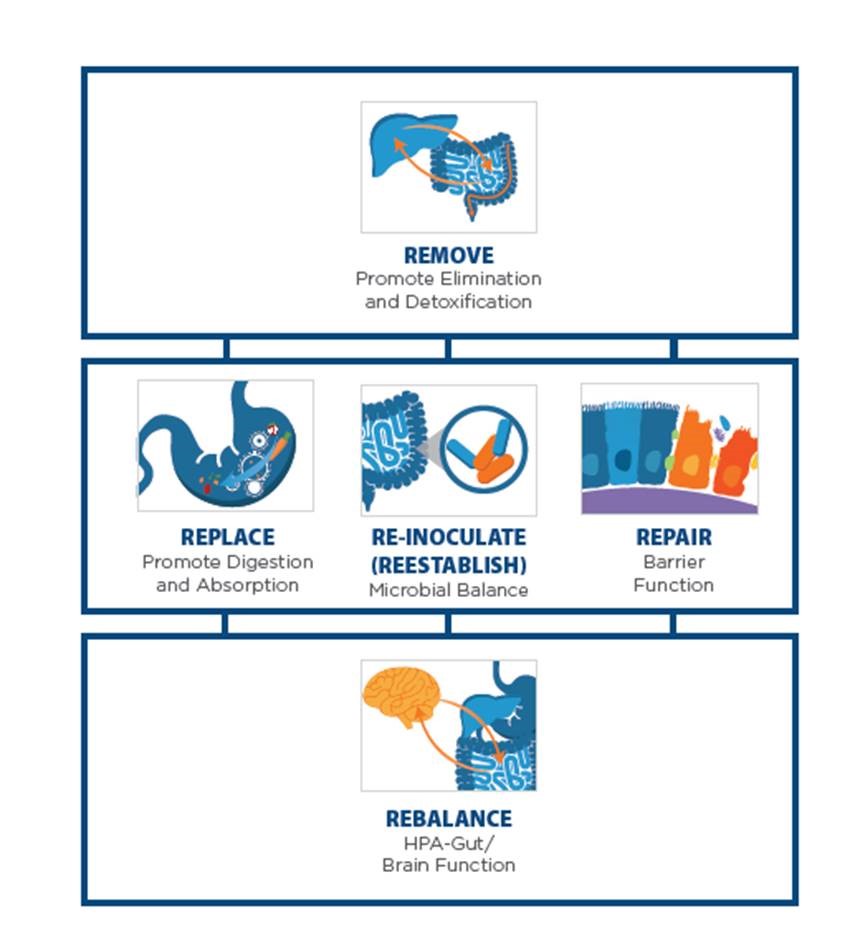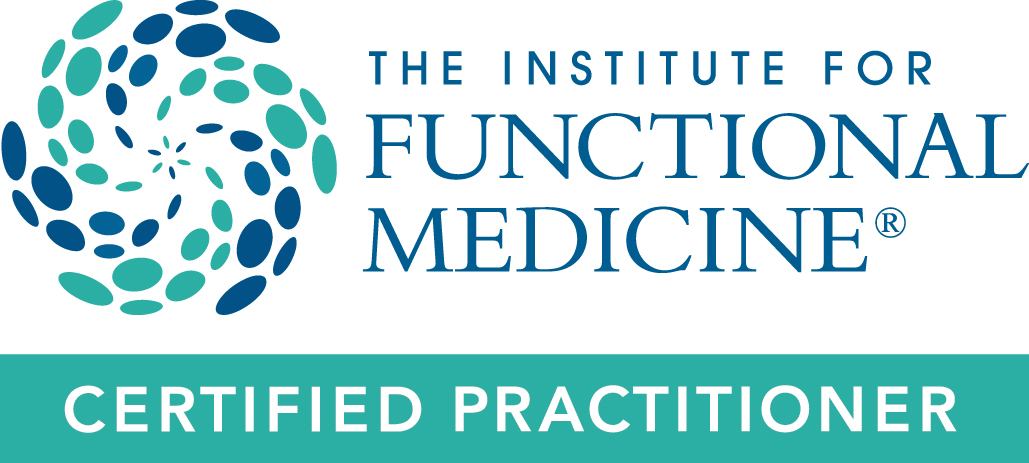Is Chronic Digestive Distress Affecting Your Life?
GI disorders affect more people in the United States than those who suffer from heart disease, AIDS and cancer combined. Over 74% of Americans have lived with some type of GI-related symptoms for more than six months. Next to the common cold, GI discomfort is the most common reason people seek medical advice or turn to over-the-counter remedies.
How We Help Our Clients Overcome Chronic Digestive Distress
The gastrointestinal tract is one of the most sophisticated systems of the human body. We often think of the GI tract for its primary role in digesting and breaking down food, but that is only a small part of a much larger role that the GI tract plays in overall health and disease.
The GI tract is truly the gateway to the rest of the body; if our GI health is compromised, our overall health is compromised. That is why it is so often the best place to start when evaluating treatment strategies.
GI disorders affect more people in the United States than those who suffer from heart disease, AIDS and cancer combined. Over 74% of Americans have lived with some type of GI-related symptoms for more than six months. These illnesses can range from occasional heartburn to severe, terminal illnesses. Next to the common cold, GI discomfort is the most common reason people seek medical advice or turn to over-the-counter remedies.
Here are examples of symptoms and conditions associated with impaired GI function:
- Heart Burn
- Bloating & Gassiness
- Constipation/Diarrhea
- IBS/IBD
- SIBO/Dysbiosis
- Leaky Gut
- Parasites
- Ulcerative Colitis
- Celiac Disease
- Brain Fog
- Stress, Anxiety, Depression
- Food Sensitivities
- Acne, Eczema, Psoriasis
- Chronic Fatigue
- Allergies, Asthma
- Thyroid Disorders
- Diabetes

Health (And Disease) Starts in the Gut
As in most systems of the body, the quality of GI health is highly influenced by lifestyle choices such as diet, physical activity and sleep.
Convenient and inexpensive food choices often contain little nutritional value and promote an increase of toxic burden.
In addition, many people cope with daily stresses by turning to alcohol, tobacco, sugar and caffeine.
Over time, these lifestyle choices impair the basic functions of the GI tract and create an environment for disease development.
Perhaps the most obvious of all its functions, the GI tract is tasked with digesting and absorbing the nutrients within the food and beverages we consume.
Through a complex coordination of enzymes, acids, bile salts, peristaltic action, transporters, and microbial biotransformation, our GI tract must take complex foodstuffs and deconstruct them into macronutrients (protein, carbohydrates, fat) and micronutrients (vitamins, minerals, phytonutrients, etc.) that can be transported into the body.
Each step in the processes of digestion is important, as it only requires a deficiency in one or a few micronutrients to lead to a metabolic dysfunction.


Assessing GI Health Imbalances
The Remove step restricts toxic, pro-inflammatory and potentially allergic foods from the diet, and eliminates harmful organisms. The traditional approach is to add a prescription medication to the body, but often the best medicine for our GI tract is in elimination and allowing the system to rest.
After the critical Remove step, our team can then help you address the need to Replace with digestive aids, Reinoculate with probiotics, and Repair a damaged GI tract.
Discover the key contributors to gastrointestinal health!
Frequently Asked Questions
Functional medicine is a science-based, individualized approach to health that goes beyond traditional medicine. It finds the root cause of illness by focusing on gut health, metabolism, hormones, environment, and genetics. A personalized diet, nutritional supplementation, and lifestyle plan is designed for your unique profile to achieve health. The Institute for Functional Medicine’s website (ifm.org) has detailed information regarding our practice model.
Both functional and holistic medicine focus on the total body. Functional medicine focuses on interactions between genetics, environment, and lifestyle that impact health. Holistic medicine has a spiritual approach to the body, mind, and soul.
Functional medicine can help with many health problems, such as fatigue, sleep problems, indigestion, weight gain, and hormonal imbalances. If you’re on multiple medications, want to get to the root of your symptoms, or want more natural ways to optimize your health, functional medicine can help you.
As a board-certified internist, I am experienced with chronic diseases such as hypertension, diabetes, cardiac, inflammatory, gastrointestinal, and autoimmune diseases. I also treat fatigue, weight gain, hormone imbalances, and gut dysfunction, such as bloating and gas.
Absolutely! In addition to treating illness, functional medicine also emphasizes prevention for health maintenance.
No, I am not a primary care provider. I will work with you as a functional medicine consultant to address the cause of your chronic health problems and discuss them with your primary care provider if necessary.
Dr. Shimizu is licensed to practice Internal Medicine (adult medicine) in the state of Hawaii.
Yes, when necessary.
I review the traditional labs obtained by your primary provider, such as cholesterol levels and blood counts. Depending on your health goals, I recommend further testing. Some examples are specialized metabolic tests, gut health, environmental toxins, or food sensitivity tests. Some of these specialized testing are not covered by insurance and are out-of-pocket.
Functional medicine is considered complementary alternative medicine; not all insurance plans cover this service. You will pay at the time of your visit, and I will provide a superbill for you if you wish to submit the claim to your insurance or apply to your flexible spending accounts (FSA). We currently accept traditional Medicare.
Rates: – Initial visit (60 minutes): $300 – Second visit (45 minutes): $225 – Follow-up visits (20 minutes): $100 – Initial Visit Package (first three visits included): $700
Go to Olena Center’s online scheduler to schedule an initial appointment. (make this a click here) You will complete health questionnaires and upload available medical records before your appointment. During the first visit, you and I will discuss your health history, family history, diet, and lifestyle habits. I will review different approaches to your health and make some suggestions for change at this time. I may also recommend laboratory testing. The second visit is generally 1-2 months later. At this time, I will evaluate your progress and further personalize your care plan. I may recommend additional dietary changes, supplements, lifestyle changes, and possibly medications. The timing for additional follow-up visits will depend on your customized plan.






